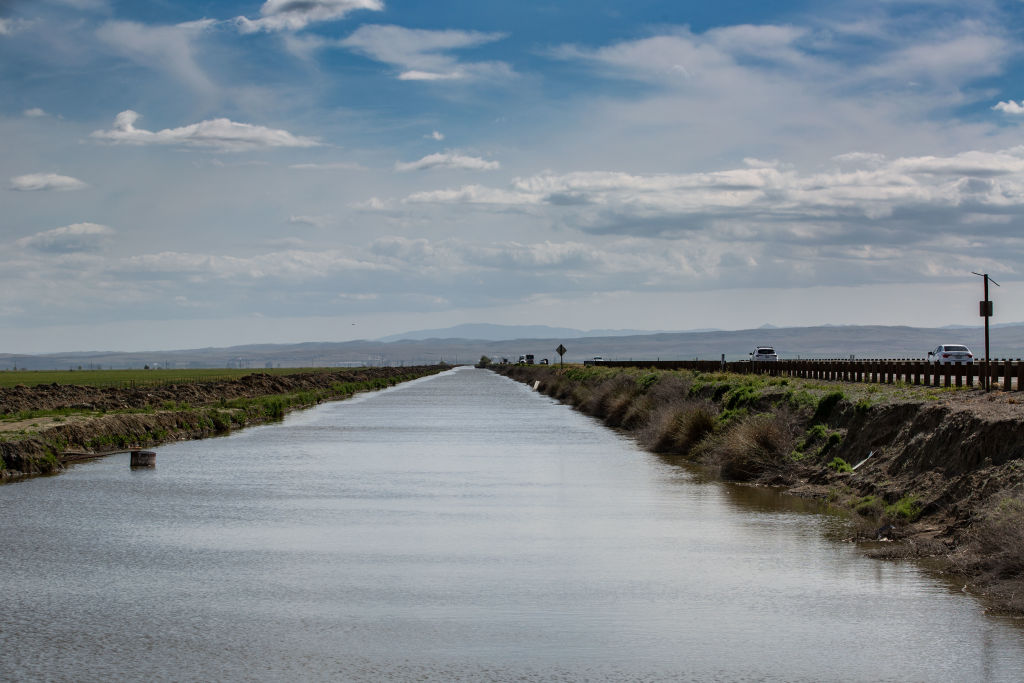California is diverting melting snow to avoid flooding


A free daily email with the biggest news stories of the day – and the best features from TheWeek.com
You are now subscribed
Your newsletter sign-up was successful
California faced a record level of rain and snowfall this past winter thanks to multiple atmospheric rivers that, per the National Oceanic and Atmospheric Administration, transport water vapor later released in the form of rain or snow through the sky. But once the resulting snowpack began to melt, reservoirs in the region began to fill up and agricultural fields started to flood, reported ABC News. "We really haven't been able to plan for something quite like this," David Feldman, director of the research center Water UCI, told the outlet. The area has been in a drought for decades.
Now, California is looking for ways to divert all that excess water, with hopes of moving H2O from full reservoirs to more empty ones downstream. That said, the state's river system is not exactly conducive to this, Greg Reis, a hydrologist at The Bay Institute, told ABC News. "We've constrained the rivers so much that a levee break could be devastating in some cases," he said. "So if we set those levees back with more room, we can actually evacuate more water out of our dams, reservoirs, right now and get them lower so they can absorb this pulse of slow melt that's coming."
Experts are particularly worried about flood waters reaching Tulare Lake, which reemerged after being dried up for 80 years. To divert water from the lake, which will threaten acres of surrounding farmland, California Gov. Gavin Newsom (D) signed an executive order allowing the state to open a "rarely used" relief valve that will direct water to the California Aqueduct, a "complex system of tunnels and pipelines that transports water from Northern California and the Sierra to the state's arid central and southern expanses," explained the Los Angeles Times.
The Week
Escape your echo chamber. Get the facts behind the news, plus analysis from multiple perspectives.

Sign up for The Week's Free Newsletters
From our morning news briefing to a weekly Good News Newsletter, get the best of The Week delivered directly to your inbox.
From our morning news briefing to a weekly Good News Newsletter, get the best of The Week delivered directly to your inbox.
Despite the complications, the stormwater and snowpack should prove valuable water resources for the state in the future, experts say. "We're going to have to kind of retool our infrastructure to be prepared to harvest and store that water and to consider it to be a central part of our water supply planning," explained Feldman. "We'd like to harvest as much of it as possible."
A free daily email with the biggest news stories of the day – and the best features from TheWeek.com
Devika Rao has worked as a staff writer at The Week since 2022, covering science, the environment, climate and business. She previously worked as a policy associate for a nonprofit organization advocating for environmental action from a business perspective.
-
 Switzerland could vote to cap its population
Switzerland could vote to cap its populationUnder the Radar Swiss People’s Party proposes referendum on radical anti-immigration measure to limit residents to 10 million
-
 Political cartoons for February 15
Political cartoons for February 15Cartoons Sunday's political cartoons include political ventriloquism, Europe in the middle, and more
-
 The broken water companies failing England and Wales
The broken water companies failing England and WalesExplainer With rising bills, deteriorating river health and a lack of investment, regulators face an uphill battle to stabilise the industry
-
 How climate change is affecting Christmas
How climate change is affecting ChristmasThe Explainer There may be a slim chance of future white Christmases
-
 Blue Origin launches Mars probes in NASA debut
Blue Origin launches Mars probes in NASA debutSpeed Read The New Glenn rocket is carrying small twin spacecraft toward Mars as part of NASA’s Escapade mission
-
 Why scientists are attempting nuclear fusion
Why scientists are attempting nuclear fusionThe Explainer Harnessing the reaction that powers the stars could offer a potentially unlimited source of carbon-free energy, and the race is hotting up
-
 Dinosaurs were thriving before asteroid, study finds
Dinosaurs were thriving before asteroid, study findsSpeed Read The dinosaurs would not have gone extinct if not for the asteroid
-
 Canyons under the Antarctic have deep impacts
Canyons under the Antarctic have deep impactsUnder the radar Submarine canyons could be affecting the climate more than previously thought
-
 SpaceX breaks Starship losing streak in 10th test
SpaceX breaks Starship losing streak in 10th testspeed read The Starship rocket's test flight was largely successful, deploying eight dummy satellites during its hour in space
-
 NASA is moving away from tracking climate change
NASA is moving away from tracking climate changeThe Explainer Climate missions could be going dark
-
 A rat infestation is spelling trouble for the almond industry
A rat infestation is spelling trouble for the almond industryThe Explainer The infestation has affected at least 100,000 acres in California
